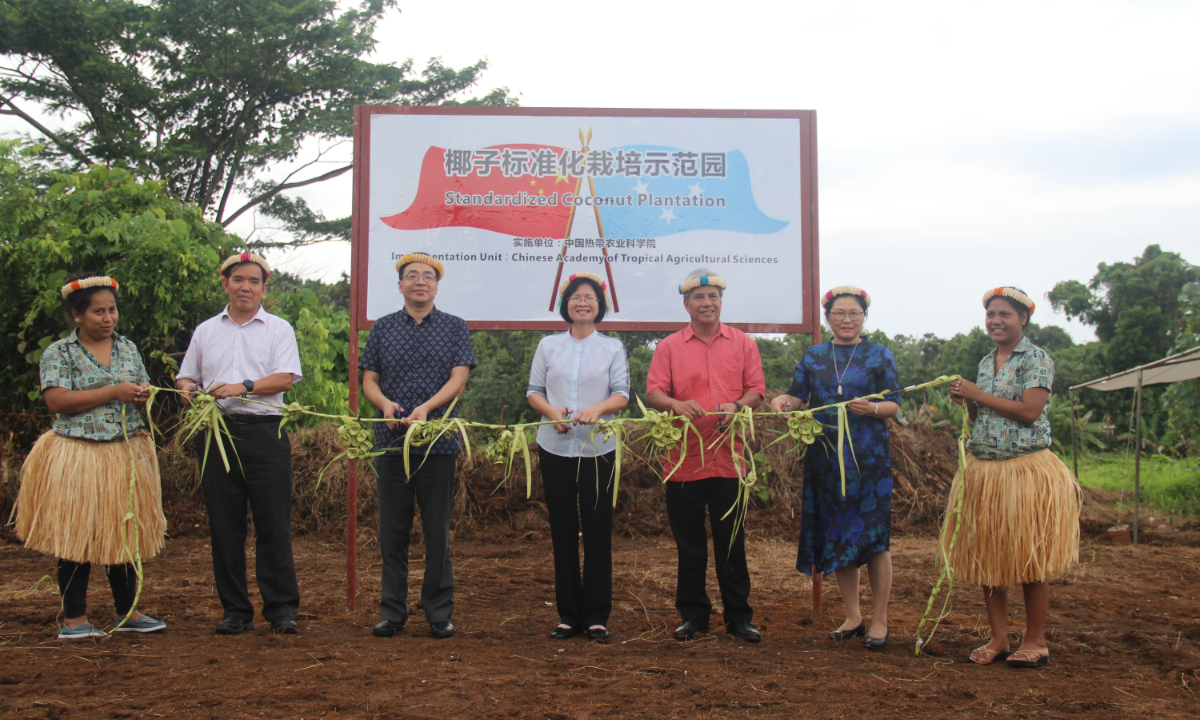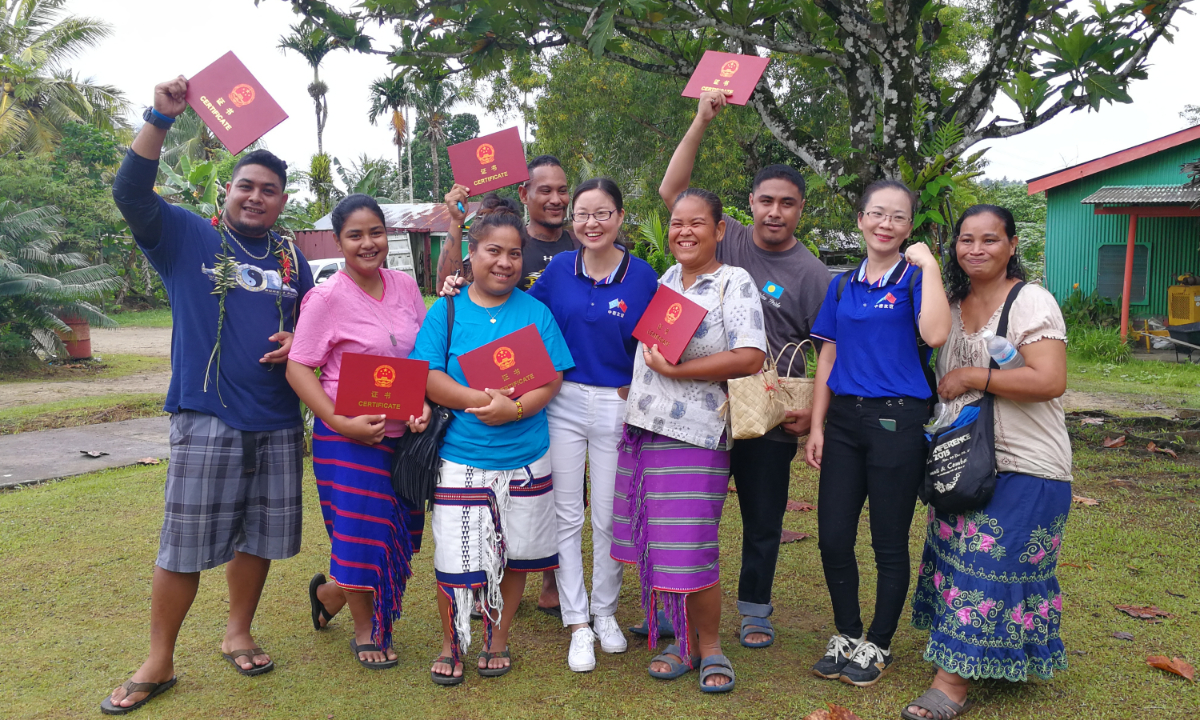Coconut farming bridges China-South Pacific friendship, ‘most effective way’ to improve local people’s lives

The groundbreaking ceremony of the Standardized Coconut Plantation in the Federated States of Micronesia Photo: Courtesy of the Chinese Academy of Tropical Agricultural Sciences
For the vast South Pacific countries with abundant tropical resources but lack talent and technology to leverage these resources, external support in the sector is the most efficient way for nations in the region to see timely economic benefits - an effort China has been engaging for years and is now becoming one of pillars for cooperation with some nations in the region.
Brushing off coronavirus headwinds over the past years, China has been dispatching farm experts, companies, holding online training classes to help local farmers, officials and companies better understand planting technology to industry cultivation, bringing tangible benefits to the local economy; Industry players are expecting more of such cooperation amid a closer tie after Chinese State Councilor and Foreign Minister Wang Yi's visit to the region.
Wang has been paying an official visit to the Solomon Islands, Kiribati, Samoa, Fiji, Tonga, Vanuatu, Papua New Guinea and East Timor upon invitation starting from Friday to June 4, and will also visit Micronesia via video and have a virtual meeting with leaders of Cook Islands and Niue. Observers believe this trip will be a milestone for relations between China and the entire region.
Wang's trip is expected to cover cooperation and deals in a wide range of fields including economy, infrastructure, climate change, public health, policing and security, experts said.
Agricultural cooperation is already producing results. One example is an online training lands in Kiribati, a South Pacific nation relies on coconut as its main industry. In November 2021, under the coordination of the Chinese Embassy in Kiribati, the Chinese Academy of Tropical Agricultural Sciences and local authority jointly held a video training conference on comprehensive utilization of coconut industry, with more than 100 participants covering Chinese experts and company representatives.
The participants exchanged views on improving the value of existing coconut products, exporting coconut products to China, and improving the research capacity of coconut industry development through visiting China in the future.
The Coconut Research Institute of the Chinese Academy of Tropical Agricultural Sciences has also drafted a Kiribati coconut processing technology and equipment selection plan, in an effort to help local coconut industry grow better, Xu Lijing, Director of International Cooperation and Exchange Center, at the Coconut Research Institute, told the Global Times on Friday.
Another project is in the Federated States of Micronesia, where China helped build a Standardized Coconut Plantation. The plantation, also a flagship project under the China-proposed Belt and Road Initiative, is becoming an important base for agricultural technology demonstration and promotion in the country.
Moreover, three training courses were also held for local people over the past several years. Through the demonstration of coconut wide and narrow row planting models and a variety of three-dimensional economic models of coconut orchards, local farmers have grasped techniques of standardized coconut production and also learned the biological control technology of pests and diseases, Xu introduced.
Due to reasons such as underdeveloped land and agricultural technology, core agricultural products cannot meet the needs of local people in Micronesia, and the high cost of agricultural production and backward technology make it difficult for local people to earn money from agricultural production. For Micronesia, agricultural technical assistance is the most direct and effective way to improve the life quality for local people, Xu said.

Training of coconut disease control technology held in the Federated States of Micronesia in 2018 Photo: Courtesy of the Chinese Academy of Tropical Agricultural Sciences
Since the South Pacific is a typical tropical region, with abundant tropical plant resources, observers said there is a huge space for cooperation in the cultivation of new varieties of tropical crops for China and more nations in the region in the future.
Liu Ze, the general secretary of Solomon Islands Chinese Business Council, told the Global Times that thanks to plenty of sunshine and rich in fresh water resources, the South Pacific nations including Solomon Islands are suitable for growing all tropical plants, such as coconut and palm.
Meanwhile, China can offer more help in tropical plant development in more varieties such as rubber, oil palm, cassava, coconut, coconut oil production, vanilla orchid and bananas, they said.
Fiji has abundant arable land resources, with fertile soil and good weather condition, which is suitable for the growth of tropical agricultural crops, and Fiji government also encourages Chinese investment in the island nation's agricultural sector, Chen Canyan, president of China Agriculture&Trade Development Association of Fiji, told the Global Times, indicating a broad area of bilateral cooperation in agricultural sector.
Chen also said that with the establishment of logistic network and opening of more logistics routes, it is expected that more tropical fruits and vegetables from Fiji could enter Chinese markets.
China and the Pacific Island countries had agreed to strengthen their mutually-beneficial cooperation in the field of agriculture in 2019. The decision came after a meeting held in Nadi, Fiji's third largest city, between China's Minister of Agriculture and Rural Affairs and his counterparts of the Pacific Island countries such as Fiji, Papua New Guinea, the Cook Islands, the Federated States of Micronesia, Niue, Samoa, Tonga and Vanuatu.
"We believe that China and the Pacific Island states enjoy a great potential for agricultural cooperation thanks to our mutual complementarity, and our further cooperation will be significant to enhancing peoples' well-being and deepening our comprehensive strategic partnership that features mutual respect and common development," the ministers said.
It is very obvious looking at the map that China is building a circle of containment against Australia, sitting right across, and capable of strangling , if necessary, Australia's air and sea links to the USA..
ReplyDeleteWakakakaka…
DeleteWhat a yankee genuflecting fart!
How about this:
It is very obvious looking at the map that US is building a circle of containment against China, sitting right across, and capable of strangling , if necessary, China's air and sea links to the outside world..
You are really a China hater. Why every time China is the villain? Before this current international events with China, US had military camps all around China, e.g. Korea, Japan, Philippine, Singapore, Afghanistan. US poured billions of USD on negative propagandas on China, sponsoring NGOs sabotaging the governing of sovereignty of China, for example sponsoring riots in Hong Kong. Training terrorists such as the ISIS, smuggling and armed terrorists into Xinjiang with the aim of creating havoc and riots in the states, promoting separatist ideology e.g. Taiwan, Hong Kong, Xinjiang, Tibet.
DeleteIn the last 40 years, China has not involved in any wars, has not interfered in any 3rd party country internal affairs, only busy doing business and trade with the world over whereas US has been busy invading other countries, involving in wars all over the world practically year in year out. Sanctioning this country and sanctioning that country. Imagine, if the world were to be without USA for the last 40 years, this world would be peaceful and great advancement and development would be achieved for the benefit of the whole world.
20 Jan 2021 - Joe Biden assumed office of POTUS
June 21 - Biden met Putin. The implication was Biden trying to divide Russia and China. Biden tried to rope Russia to US side.
US views China as bigger threat than Russia so US dreamt that with Russia on its side China can be easily defeated after which US can demolish Russia next.
Unfortunately Russia did not take the bait so Plan B for US is to demolish Russia separately by provoking Russia into aggression on Ukraine and then commanding its allies especially NATO and the rest of the world to sanction Russia thinking that it will easily cripple and defeat Russia. The story is still being scripted.
Meanwhile an eventuality which US dreaded most happened, they drove the Bear and the Panda together which will hasten the demolition of the US hegemony and to the beginning of a new and better world order. Wakakakaka
(16) 如果美军直接插手台湾,那俄军也会和解放军联手…… - YouTube
Don’t run away, the above is in English with Chinese sub-titles